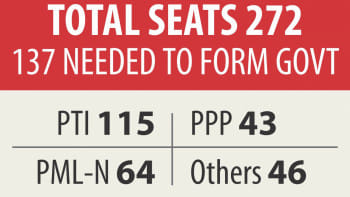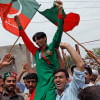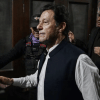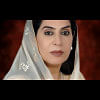Imran still striving to get required numbers to form govt
Though the Pakistan Tehreek-i-Insaf (PTI) has emerged as the single largest party in the National Assembly after the July 25 elections and its leaders have been claiming that they will not need support of any other party, the final preliminary results issued by the Election Commission of Pakistan (ECP) on Saturday show that the party is still short of numbers to form its government on its own.
On the other hand, two other major parties -- the Pakistan Peoples Party (PPP) and the Pakistan Muslim League-Nawaz (PML-N) -- are expected to meet in a couple of days to devise a joint strategy in a bid to give a tough time to the PTI in parliament.
According to TV reports, senior PPP leader Syed Khursheed Shah will meet PML-N president Shahbaz Sharif in Islamabad today.
The electronic media throughout the day on Saturday kept on mentioning names of possible candidates for key government offices and possible members of the federal cabinet. But sources in the PTI told Dawn that no names were discussed in meetings held in Banigala as the party was still busy in making calculations.
When contacted, the PTI's Shafqat Mehmood claimed that no formal meeting had taken place in Banigala and that they (PTI leaders) had a general discussion on the challenges the party could face after formation of the government, but no names of federal ministers or chief ministers were discussed.
Mr Mehmood also denied reports that his party had nominated him for the office of the NA speaker.
According to the complete preliminary results announced by the ECP, the PTI has obtained 115 general seats -- 12 short of a simple majority -- while the PML-N and PPP have won 64 and 43 seats, respectively.
The PTI leaders who have won more than one seat will have to vacate additional seats as the law allows an individual to retain only one seat. PTI chairman Imran Khan has won five seats and he will have to vacate four seats.
Ghulam Sarwar Khan of Taxila has also won two NA seats by defeating former interior minister Chaudhry Nisar Ali Khan and he will also have to vacate one seat.
Former chief minister of Khyber Pakhtunkhwa Pervez Khattak has won both National Assembly and provincial assembly seats. If the PTI decides to nominate him again for the office of the chief minister, he will also have to vacate the NA seat which means that the party's seats will be reduced to 109.
It was after these calculations that the PTI leadership has now decided to reach out to other smaller groups and independents since the party has already declared that it will not join hands with the PPP and the PML-N.
Sources said that former secretary general of the PTI Jahangir Tareen had established contacts with independents and the Muttahida Qaumi Movement-Pakistan (MQM-P) which has won six seats. There are 13 independents who have won the NA seats.
The sources said Mr Khan had himself contacted Mumtaz Bhutto of the Grand Democratic Alliance (GDA) to formally invite the alliance to join the coalition government.
The PML-Quaid (PML-Q) has won four seats, but it also includes two seats won by former Punjab chief minister Chaudhry Pervez Elahi, which means that the PTI will only be able to get the support of three PML-Q members. Besides this, the PTI is also expected to get the support of the Balochistan Awami Party (BAP) which has bagged four seats.
If the PTI obtains support of the GDA, MQM-P, PML-Q and the Awami Muslim League, the number of its seats will become 122 -- still 15 short of the required numbers, which is more than the independents who have won the elections.
Other parties which will have representation in the NA are the Balochistan National Party-Mengal (BNP-M) with three members, and Jamhoori Watan Party, Awami National Party and Pakistan Tehreek-i-Insaniyat with one seat each.
Though the PPP and the PML-N have also rejected the elections results, sources in the two parties told Dawn that they would not support the Muttahida Majlis-i-Amal (MMA)'s call for boycotting the oath-taking session of the National Assembly.
"We have decided to play the role of an aggressive opposition in parliament," said a senior PML-N leader who had participated in the MMA-convened multiparty conference in Islamabad on Friday.
A senior leader of the PPP said so far they had not finalised any strategy for the elections of key parliamentary offices.
PPP chairman Bilawal Bhutto-Zardari on Saturday formed a committee to engage with political parties to discuss the way forward in the post-poll scenario.
According to an official announcement, members of the committee are Yousuf Raza Gillani, Syed Khursheed Shah, Sherry Rehman, Farhatullah Babar, Qamar Zaman Kaira, Raja Pervaiz Ashraf and Syed Naveed Qamar.
The sources said contact had been established between the PPP and the PML-N and the leaders of the two sides were expected to hold a meeting in a few days.

 For all latest news, follow The Daily Star's Google News channel.
For all latest news, follow The Daily Star's Google News channel. 









Comments